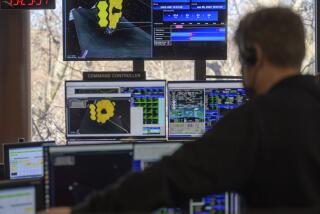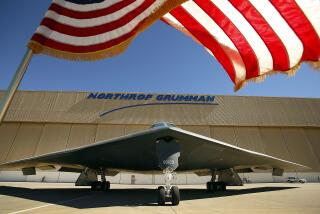Northrop Job Cuts May Signal Slowdown on Stealth Program
- Share via
Northrop has begun to lay off employees at its Stealth bomber plant in Pico Rivera, it was learned Tuesday, a signal that the secret defense program may be experiencing at least a temporary slowdown.
Layoffs of 100 or fewer workers are not unusual in big defense programs as requirements for different skills change, aerospace industry sources said, but even minor cutbacks in the Stealth program could represent a problem at a time when the company should be expanding its work force. Northrop has about 14,000 employees at its advanced systems division in Pico Rivera, working on the Stealth and other secret projects.
The number of layoffs that have occurred could not be determined. A Northrop spokesman issued a statement saying only, “Our employment is where we planned it to be.” He termed other questions as “sheer speculation.”
When Northrop announced that it had received a $2-billion Air Force contract on the bomber in November, it was widely assumed that the award meant that Northrop was ready to begin production of the aircraft, which is intended to fly virtually undetected through enemy radar using a variety of new technologies.
Some Contracts Canceled
But industry experts told The Times that if Northrop were ready to launch production, it would not be shrinking its work force. Aircraft production programs can require up to 25,000 employees at the prime contractor alone, and Northrop appears to be well short of that.
Meanwhile, LTV, a major subcontractor on the bomber program, has announced the layoff of 1,000 of its 11,000 employees in Dallas.
The Times reported last month that Northrop had delayed the first flight of the Stealth bomber until August. The new information about the work force shrinkage suggests that production schedules now have been delayed as well. It has also been reported that Defense Secretary Frank C. Carlucci recently approved a delay in the program.
In any high-technology weapons program, technical problems are not unusual. In most cases, these problems are solved and the program goes on to a successful production phase. But sometimes, problems continue to dog programs and eventually cause abrupt cancellations, such as those that occurred on the Army’s Sgt. York gun or the Air Force’s T-46 trainer.
Several sources at Northrop’s Pico Rivera plant said they had been told by management of “potentially hundreds” of layoffs.
Purchasing agents at the plant have been told that some of them may be laid off soon, and some engineers have already received pink slips, according to two sources inside the plant. In addition, certain hourly production workers are being furloughed.
Since information on the program is tightly controlled, even employees do not know how many layoffs will occur throughout the plant. But speculation running through the plant is that a sizable cutback is coming.
In addition, a freeze has been placed on hiring of employees not working directly under a government contract, known in the industry as indirect employees, and Northrop has suspended most overtime.
Aerospace recruiters say some contracts for recruitment services have also been canceled recently. Even without a big layoff, aerospace companies normally have to hire people constantly to replace those who leave through normal attrition.
The Air Force has also slowed activity at LTV Aircraft Products Group in Dallas, a major Stealth subcontractor, reportedly because of problems in controlling the configuration of the aircraft, according to two industry sources.
Configuration control refers to the need for maintaining tight accounting of the thousands of engineering drawings that are generated in an aircraft design, all of which are subject to many changes in the design process.
The government suspended some operations at LTV after some disorders in configuration emerged, according to two knowledgeable industry officials. A government team was sent into the plant to conduct a “configuration audit,” but it is unknown whether normal operations have resumed.
LTV announced last week that it was laying off 1,000 of its 11,000 employees, an action that was not officially linked to any program at the company. But none of LTV’s non-secret programs appear to be shrinking at this time.
An LTV spokesman said he could not comment on any aspect of the company’s Stealth bomber work. He said the layoffs, which included both salaried and hourly employees, were prompted by expectations of future budget cuts.
Under its secret contract with the Air Force, Northrop is prohibited from discussing the Stealth bomber program. The difficult restriction has prevented Northrop from discussing a program that represents about half its sales, which amounted to $1.46 billion in the third quarter ended Sept. 30.
Experts are divided on how serious Northrop’s problems with the Stealth program are. Aerospace analyst Wolfgang Demisch of First Boston said in a report recently: “Northrop is experiencing widely publicized but, in our view, entirely normal problems in producing the aircraft.”
One Northrop employee at Pico Rivera, acknowledging that the program had some problems, said he believes that they are normal setbacks for a relatively new program.
But some aircraft industry experts are dubious about the program because of the risky technology that is involved and because of the delays that have occurred. The flight delays cumulatively add up to more than one year, sources said, representing a more than typical amount of technical trouble with a new aircraft.
Aviation Week & Space Technology magazine has reported that structural parts of the aircraft are not fitting together properly at Northrop’s assembly plant in Palmdale. The parts are made of composite materials that pose new problems in aircraft production methods.
More to Read
Inside the business of entertainment
The Wide Shot brings you news, analysis and insights on everything from streaming wars to production — and what it all means for the future.
You may occasionally receive promotional content from the Los Angeles Times.











